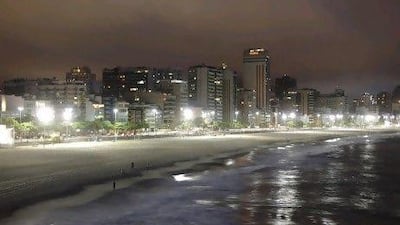Sand, sea and samba. Brazil's beautiful beaches, bustling economy and exotic nightlife have always been a favourite of the world's financial community. But now global property investors, including those from the UAE, and second-home buyers are moving in.
Location, location, location:
Industry Insights What's hot and what's not in the world of property. Learn More
The South American giant is in the middle of what the international analyst BMI calls "an epic real estate boom". Home prices rose 20 per cent last year, an expansion rate that is only a distant memory in most parts of the world.
"Brazil ticks all the boxes [for property investors]," says Paul Preston, the managing director of Elysian Properties, one of several local companies promoting property in the country.
Brazil's economy continues to surge despite the global downturn, with GDP expanding at an annual rate of 5 per cent, thanks to a diverse manufacturing base and escalating energy sector.
Brazil will get another boost when it hosts the 2014 FIFA World Cup, which has already provided a huge infusion of infrastructure spending. And the Olympics will take over Rio de Janeiro two years later.
The property industry has been one of the major beneficiaries of the economic growth. More than 30 million Brazilians have joined the middle class since 2003 - and they are eager to buy homes.
At the same time, financing is more widely available, resulting in millions of home buyers using mortgages for the first time.
"For 100 years people in Brazil couldn't buy property because they couldn't afford to buy property," says Sam Rodgers, the Middle East and North Africa director for the Bric Group, another company selling Brazilian property in the Middle East. "There is a massive housing deficit."
Between 5 million and 8 million homes are needed to meet the demand, economists estimate.
To help to spur construction of affordable homes, the government in 2009 launched a programme called Minha Casa Minha Vida, which aims to subsidise construction of more than 3 million houses by 2014.
The result is a rare opportunity for international investors, who can target domestic housing projects as well as the beachfront resorts that typically attract the attention of the global industry.
"Interest in Brazilian property has surged in the last five years," says Liam Bailey, the research director at Knight Frank, a property agency based in London.
There is still a lack of transparency in the market, high inflation and an overvalued currency, Knight Frank notes in its research. And the current levels of capital appreciation are almost certainly unsustainable.
But increasing foreign investment, expanding tourism and the availability of financing should spark continued growth.
In prime locations, such as the fabled Ipanema beach, prices for new apartments were up more than 30 per cent in April compared with the same period last year, Knight Frank says.
As a global property market Brazil is still in its infancy, with only 1 per cent of wealthy investors in North America targeting the country, compared with 17 per cent who favoured France and 12 per cent looking at Mexico, according to Knight Frank.
"At present, US and Latin American investors predominate," Mr Bailey says. "But we expect the origin of investors to diversify in the next five years particularly given Brazil is to be the host country for the 2014 soccer World Cup and the 2016 Olympics placing it firmly in the spotlight."
Prices in Brazil are still far below what can be found in most mature European and Latin American markets, even in beach resort areas.
Mr Rodgers' company is selling 450-square-metre plots in an unbuilt development on the waterfront for US$36,500 (Dh134,065). Apartments in the development are priced at $188,000.
In most areas of the world, off-plan sales in projects such as the one marketed by Mr Rodgers have dried up. Too many investors were burnt in the global property collapse by projects that were never built or did not live up to expectations.
But Mr Rodgers says he has sold 250 plots and apartments in the past year, primarily to buyers from the UAE, Kuwait and Qatar.
A security industry executive based in Dubai, who asked not to be named, recently bought four plots valued at between $60,000 and $65,000 each in Rio Hills, a 3.3 million sq ft development next to Lake Guarapine in the state of Rio de Janeiro.
He bought the property even though he has never been to Brazil. "You can live in Brazil easily, you can start a business easily and you can get your money out easily," he says.
The buyer plans to build a house for himself and either rent or sell the other parcels. He investigated India, South Africa, Spain and other markets but concluded those countries are "not booming like Brazil".
Mr Preston's company, which owns Rio Hills, has sold 35 plots in recent weeks. He plans a trip to Qatar next week to market the project, focusing on the demand for housing and Brazil's growing economy.
"People are investing in a market where there is demand for the product," he says.

